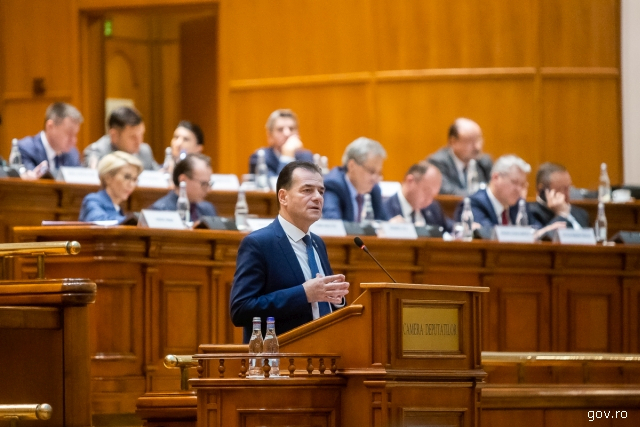The 2020 budget bill
Romanian government to pass 2020 budget bill through procedure implying a vote of confidence in the government itself.

Ştefan Stoica, 24.12.2019, 14:00
Almost two weeks ago, the Liberal
minority cabinet led by Ludovic Orban assumed responsibility in Parliament
vis-a-vis three bills. This is a convenient instrument for the government,
allowing it to pass legislation without a debate in Parliament. All political
parties warned at the time that it would set a dangerous precedent if the
government resorted, for the first time in Romania’s post-communist democratic
society, to such a procedure in the case of the 2020 budget bill. The Liberal
cabinet ignored, however, the warning and on Monday went ahead and officially
assumed responsibility in Parliament regarding the budget bill and the social
security bill for 2020.
Prime minister Ludovic Orban invoked
the lack of time, explaining he chose this path in order to be able to pass the
budget bill by the end of this year. The procedure is an option stipulated by
the Romanian Constitution and, unlike emergency orders, is of a more democratic
nature, said Orban, reminding MPs that they may well resort to a vote of
no-confidence if they want to block the legislation in question.
The Social Democrats, in opposition,
will not file a no-confidence motion, but have asked the Constitutional Court
to check for the possibility of a legal conflict between the government and
Parliament in respect of the government’s move. The interim president of the
Social Democratic Party Marcel Ciolacu says there is no precedent in Europe
where a government has passed the state budget bill without Parliament debating
it. Even if we can’t manage to block this bill, we will make sure, that, if
the court rules in our favour, we will prevent something like this happening in
the future, said Ciolacu. The Constitutional Court has set January 10th
as the deadline for the presentation of arguments by the government and
Parliament.
The prime minister says this is an
important bill, one by which Romania needs to send a firm signal that it wants
to address the economic imbalance it has had to deal with so far. The budget
bill is based on a 4.1% economic growth rate, a 3.1% inflation rate and an
average exchange rate of 4.75 lei for one euro. Prime minister Ludovic Orban
says the government has come up with a budget that is based on data it
considers real and which are similar to the forecasts of the European
Commission and the International Monetary Fund. He recalled that the budget
bill for 2020 had to take into account exiting legislation, such as the pension
and salary laws, which require additional funding. At the same time, the government
aims to cut staff expenses in favour of investments, especially for
infrastructure, without which Romania will not be able to have solid economic
growth. This is why the government has agreed to a number of amendments to the
budget bill. Romania, Orban concluded, needs to send a strong signal that it
intends to fight economic imbalances and reduce the budget deficit within the
next three years, to the 3% level agreed in the EU treaty.






























